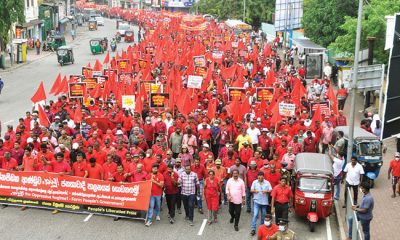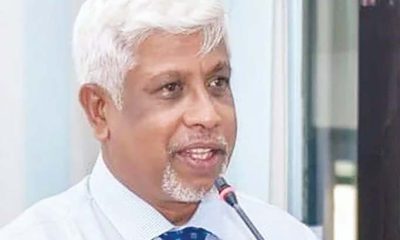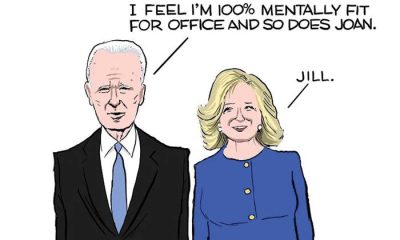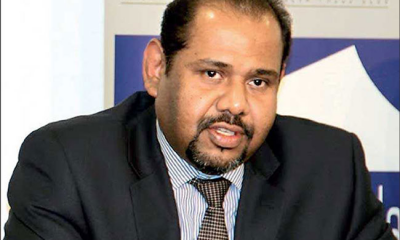Features
Next presidential election and choice before people
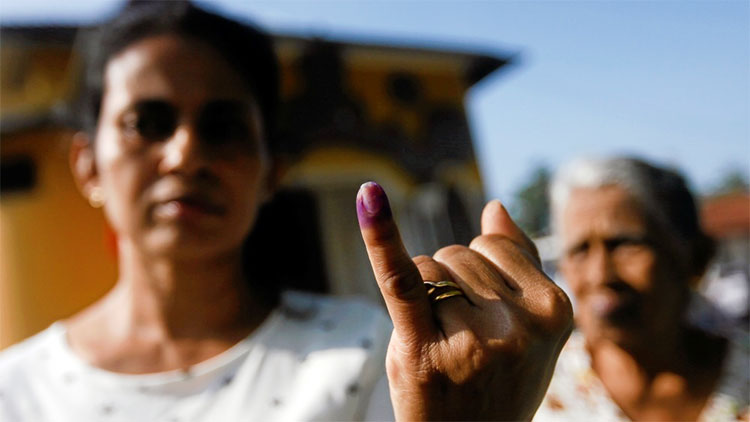
The popular influence of the National People’s Power has also created a delusion among Western embassies in Colombo. Ambassadors of many countries, including the US Ambassador, often meet with the leaders of the National People’s Power. It seems that those leaders, who strongly opposed the ‘imperialists’ of the West, including America, want to change that ‘appearance’ to a large extent. It can be seen that those leaders, who call on the people to give the government to them, are carrying out their activities with the understanding that it is not enough to mobilize the people locally to come to power but also need the support of the international community.
By Veeragathy Thanabalasingham
The headline of this article may sound premature. But, barring some unexpected disruptions if the presidential election goes ahead as announced by President Ranil Wickremesinghe, by this time next year we will be under the rule of a new president.
Although Wickremesinghe has said several times that the presidential election will be held next year, he has consistently refused to comment on his participation in it.
President Wickremesinghe recently participated in a YouTube channel discussion with the managing editor of one of the Indian influential online News Services Firstpost in the ‘Vantage with Balki Sharma’ programme.
The President was seen giving evasive answers to most of the controversial questions while replying to Palki Sharma’s questions on domestic affairs, regional situations, international politics and cricket.
When asked whether he would run for the presidency next year, the President responded that his first task was to bring the economy to a stable level. When asked what decision he would take after doing that, he said that first let the economy stabilize and then see what decision to take.
Responding to Palki Sharma’s question that if he were to contest the presidential election, would he seek the support of Rajapaksa’s party, the President said that although he belonged to the United National Party, he was acting as a president who did not think in terms of party line and he would answer this question when the time came to think in terms of party politics.
The event was yet another occasion when he refrained from giving a definitive answer about running for president.
The day after the presentation of the 2024 Budget in Parliament last month, the President met the editors of the Colombo newspaper, at the presidential secretariat, and he replied to a question by an English newspaper editor that he has not yet decided whether to contest the presidential election as he is fully focused on ending the economic crisis in the country.
Meanwhile, the leader of the National Freedom Front, former minister Wimal Weerawansa had said a few days ago that Wickremesinghe will not contest the presidential election and will spend his retirement by taking an important position in some international organizations.
Some ruling party politicians, at a meeting with the President, brought to his notice Weerawansa’s comments. In response, he said that it was up to him to decide whether to contest the presidential election or not and Weerawansa had nothing to do with it.
Even though the President has consistently refused to say whether he is running for office, even many of his political detractors have openly said that there is no other political leader with the same political experience, knowledge and international influence as him.
So far, Opposition Leader Sajith Premadasa and National People Power leader Anura Kumara Dissanayake have announced themselves as candidates for the next presidential election. Even former President Maithripala Sirisena said a few months ago that he, too, intends to contest the presidential election. But no one seems to take him seriously.
All the latest opinion polls show Dissanayake ahead of Premadasa in terms of popular support. The National People’s Power has taken advantage of the political situation after last year’s Aragalaya uprising to gain considerable influence among the people. The main reason for this is the hatred towards the traditional mainstream political parties.
The popular influence of the National People’s Power has also created a delusion among Western embassies in Colombo. Ambassadors of many countries, including the US Ambassador, often meet with the leaders of the National People’s Power. It seems that those leaders, who strongly opposed the ‘imperialists’ of the West, including America, want to change that ‘appearance’ to a large extent. It can be seen that those leaders, who call on the people to give the government to them, are carrying out their activities with the understanding that it is not enough to mobilize the people locally to come to power but also need the support of the international community.
Even in terms of economic policies, they openly say that their positions have changed drastically to suit the changed international situation and that it is not appropriate to judge them with the early JVP in mind.
As for Sajith Premadasa, he has been trying hard to prove himself as someone who can fill the void left by his father late president Ranasingha Premadasa.
But an important question is whether the majority of the people of the country are ready to accept him as a leader with the political maturity and vision to lead the country amidst serious political and economic crises.
Although Premadasa earned credibility in politics by defeating Wickremesinghe, who denied him the leadership of the United National Party, in the last parliamentary election, Wickremesinghe and the United National Party have worked hard to create a negative image of him as a leader who is reluctant to face challenges after refusing to accept the post of Prime Minister at the invitation of President Gotabaya Rajapaksa amid the popular uprising last year. are involved.
The President has said countless times in Parliament, and outside, that Premadasa is not up to the challenge of bringing the country out of economic crisis.
Meanwhile, the recent Supreme Court ruling is a further setback for the Rajapaksas, who are facing major problems in regaining popular support due to their administration’s responsibility for the economic crisis.
Aware of the potential problems for their future politics as a result of that ruling, they are now under great pressure to campaign that they are not entirely responsible for the economic crisis.
Mahinda Rajapaksa, more than any other Rajapaksa, has to carry this work forward. He is still the political face of the family. No other Rajapaksa could even come close to playing his role even after years of political involvement.
Mahinda Rajapaksa needs to justify the activities of his regime in order to ensure the political future of his eldest son Namal. Last week, he issued a lengthy statement entitled ‘The Origins of Sri Lanka’s Economic Crisis’, claiming that a stable economy had been built during his tenure, i.e. 2006 – 2014.
Although Mahinda Rajapaksa used statistics when presenting budgets in Parliament as Finance Minister, he did not usually focus on statistics in his speeches or statements. His speeches are mostly populist.
However, this report is purely statistical. In January 2015, he pointed out that in a report released by the International Monetary Fund in September 2014, Sri Lanka’s economic activity was generally higher than expected and Sri Lanka was on its way to joining the ranks of upper-middle-income countries, which had seen significant progress in recent years, and that Sri Lanka’s economic growth was one of the fastest-growing leading Asian economies. He has said that he left behind a very vibrant economy.
Mahinda Rajapaksa, who had said that when he took office as Prime Minister in November 2019, his government had to take over an economy that had already seen a major setback, noted that the Covid-19 pandemic hit Sri Lanka in such a weak state. “It is important to note that GDP per capita is the most fundamental economic indicator in any discussion of the economy. Sri Lanka’s GDP per capita during the period 2006 – 2014 was more than double the combined GDP of all post-independence governments. So, people’s decisions should be based on proper data and explanations and not on lies and propaganda. Sri Lanka will not tolerate another political mistake like the one made in January 2015,” he concluded in his statement. It is noteworthy that no one has issued a counter statement to refute the numerous statistics mentioned in his report.
No one will have difficulty in understanding the message Mahinda Rajapaksa is conveying through his appeal to the people of the country not to repeat the political mistake that defeated him in the 2015 presidential election.
The Rajapaksas and their loyalists are saying that Sri Lanka Podujana Peramuna will field its candidate in the next presidential election. It is highly unlikely that the candidate fielded by that party will be anyone other than a Rajapaksa. Speculations are rife in political circles that they are planning to field one of their loyalists (like Dhammika Perera) instead of directly contesting this time as their popular influence is very low. There was a time when there was an expectation that Podujana Peramuna might support Wickremesinghe in the presidential election. That is no longer the case. We can certainly expect many dramatic events in Sri Lankan politics in the coming months.
(Writer is a journalist based in Colombo)
Features
The heart-friendly health minister

by Dr Gotabhya Ranasinghe
Senior Consultant Cardiologist
National Hospital Sri Lanka
When we sought a meeting with Hon Dr. Ramesh Pathirana, Minister of Health, he graciously cleared his busy schedule to accommodate us. Renowned for his attentive listening and deep understanding, Minister Pathirana is dedicated to advancing the health sector. His openness and transparency exemplify the qualities of an exemplary politician and minister.
Dr. Palitha Mahipala, the current Health Secretary, demonstrates both commendable enthusiasm and unwavering support. This combination of attributes makes him a highly compatible colleague for the esteemed Minister of Health.
Our discussion centered on a project that has been in the works for the past 30 years, one that no other minister had managed to advance.
Minister Pathirana, however, recognized the project’s significance and its potential to revolutionize care for heart patients.
The project involves the construction of a state-of-the-art facility at the premises of the National Hospital Colombo. The project’s location within the premises of the National Hospital underscores its importance and relevance to the healthcare infrastructure of the nation.
This facility will include a cardiology building and a tertiary care center, equipped with the latest technology to handle and treat all types of heart-related conditions and surgeries.
Securing funding was a major milestone for this initiative. Minister Pathirana successfully obtained approval for a $40 billion loan from the Asian Development Bank. With the funding in place, the foundation stone is scheduled to be laid in September this year, and construction will begin in January 2025.
This project guarantees a consistent and uninterrupted supply of stents and related medications for heart patients. As a result, patients will have timely access to essential medical supplies during their treatment and recovery. By securing these critical resources, the project aims to enhance patient outcomes, minimize treatment delays, and maintain the highest standards of cardiac care.
Upon its fruition, this monumental building will serve as a beacon of hope and healing, symbolizing the unwavering dedication to improving patient outcomes and fostering a healthier society.We anticipate a future marked by significant progress and positive outcomes in Sri Lanka’s cardiovascular treatment landscape within the foreseeable timeframe.
Features
A LOVING TRIBUTE TO JESUIT FR. ALOYSIUS PIERIS ON HIS 90th BIRTHDAY

by Fr. Emmanuel Fernando, OMI
Jesuit Fr. Aloysius Pieris (affectionately called Fr. Aloy) celebrated his 90th birthday on April 9, 2024 and I, as the editor of our Oblate Journal, THE MISSIONARY OBLATE had gone to press by that time. Immediately I decided to publish an article, appreciating the untiring selfless services he continues to offer for inter-Faith dialogue, the renewal of the Catholic Church, his concern for the poor and the suffering Sri Lankan masses and to me, the present writer.
It was in 1988, when I was appointed Director of the Oblate Scholastics at Ampitiya by the then Oblate Provincial Fr. Anselm Silva, that I came to know Fr. Aloy more closely. Knowing well his expertise in matters spiritual, theological, Indological and pastoral, and with the collaborative spirit of my companion-formators, our Oblate Scholastics were sent to Tulana, the Research and Encounter Centre, Kelaniya, of which he is the Founder-Director, for ‘exposure-programmes’ on matters spiritual, biblical, theological and pastoral. Some of these dimensions according to my view and that of my companion-formators, were not available at the National Seminary, Ampitiya.
Ever since that time, our Oblate formators/ accompaniers at the Oblate Scholasticate, Ampitiya , have continued to send our Oblate Scholastics to Tulana Centre for deepening their insights and convictions regarding matters needed to serve the people in today’s context. Fr. Aloy also had tried very enthusiastically with the Oblate team headed by Frs. Oswald Firth and Clement Waidyasekara to begin a Theologate, directed by the Religious Congregations in Sri Lanka, for the contextual formation/ accompaniment of their members. It should very well be a desired goal of the Leaders / Provincials of the Religious Congregations.
Besides being a formator/accompanier at the Oblate Scholasticate, I was entrusted also with the task of editing and publishing our Oblate journal, ‘The Missionary Oblate’. To maintain the quality of the journal I continue to depend on Fr. Aloy for his thought-provoking and stimulating articles on Biblical Spirituality, Biblical Theology and Ecclesiology. I am very grateful to him for his generous assistance. Of late, his writings on renewal of the Church, initiated by Pope St. John XX111 and continued by Pope Francis through the Synodal path, published in our Oblate journal, enable our readers to focus their attention also on the needed renewal in the Catholic Church in Sri Lanka. Fr. Aloy appreciated very much the Synodal path adopted by the Jesuit Pope Francis for the renewal of the Church, rooted very much on prayerful discernment. In my Religious and presbyteral life, Fr.Aloy continues to be my spiritual animator / guide and ongoing formator / acccompanier.
Fr. Aloysius Pieris, BA Hons (Lond), LPh (SHC, India), STL (PFT, Naples), PhD (SLU/VC), ThD (Tilburg), D.Ltt (KU), has been one of the eminent Asian theologians well recognized internationally and one who has lectured and held visiting chairs in many universities both in the West and in the East. Many members of Religious Congregations from Asian countries have benefited from his lectures and guidance in the East Asian Pastoral Institute (EAPI) in Manila, Philippines. He had been a Theologian consulted by the Federation of Asian Bishops’ Conferences for many years. During his professorship at the Gregorian University in Rome, he was called to be a member of a special group of advisers on other religions consulted by Pope Paul VI.
Fr. Aloy is the author of more than 30 books and well over 500 Research Papers. Some of his books and articles have been translated and published in several countries. Among those books, one can find the following: 1) The Genesis of an Asian Theology of Liberation (An Autobiographical Excursus on the Art of Theologising in Asia, 2) An Asian Theology of Liberation, 3) Providential Timeliness of Vatican 11 (a long-overdue halt to a scandalous millennium, 4) Give Vatican 11 a chance, 5) Leadership in the Church, 6) Relishing our faith in working for justice (Themes for study and discussion), 7) A Message meant mainly, not exclusively for Jesuits (Background information necessary for helping Francis renew the Church), 8) Lent in Lanka (Reflections and Resolutions, 9) Love meets wisdom (A Christian Experience of Buddhism, 10) Fire and Water 11) God’s Reign for God’s poor, 12) Our Unhiddden Agenda (How we Jesuits work, pray and form our men). He is also the Editor of two journals, Vagdevi, Journal of Religious Reflection and Dialogue, New Series.
Fr. Aloy has a BA in Pali and Sanskrit from the University of London and a Ph.D in Buddhist Philosophy from the University of Sri Lankan, Vidyodaya Campus. On Nov. 23, 2019, he was awarded the prestigious honorary Doctorate of Literature (D.Litt) by the Chancellor of the University of Kelaniya, the Most Venerable Welamitiyawe Dharmakirthi Sri Kusala Dhamma Thera.
Fr. Aloy continues to be a promoter of Gospel values and virtues. Justice as a constitutive dimension of love and social concern for the downtrodden masses are very much noted in his life and work. He had very much appreciated the commitment of the late Fr. Joseph (Joe) Fernando, the National Director of the Social and Economic Centre (SEDEC) for the poor.
In Sri Lanka, a few religious Congregations – the Good Shepherd Sisters, the Christian Brothers, the Marist Brothers and the Oblates – have invited him to animate their members especially during their Provincial Congresses, Chapters and International Conferences. The mainline Christian Churches also have sought his advice and followed his seminars. I, for one, regret very much, that the Sri Lankan authorities of the Catholic Church –today’s Hierarchy—- have not sought Fr.
Aloy’s expertise for the renewal of the Catholic Church in Sri Lanka and thus have not benefited from the immense store of wisdom and insight that he can offer to our local Church while the Sri Lankan bishops who governed the Catholic church in the immediate aftermath of the Second Vatican Council (Edmund Fernando OMI, Anthony de Saram, Leo Nanayakkara OSB, Frank Marcus Fernando, Paul Perera,) visited him and consulted him on many matters. Among the Tamil Bishops, Bishop Rayappu Joseph was keeping close contact with him and Bishop J. Deogupillai hosted him and his team visiting him after the horrible Black July massacre of Tamils.
Features
A fairy tale, success or debacle

Sri Lanka-Singapore Free Trade Agreement
By Gomi Senadhira
senadhiragomi@gmail.com
“You might tell fairy tales, but the progress of a country cannot be achieved through such narratives. A country cannot be developed by making false promises. The country moved backward because of the electoral promises made by political parties throughout time. We have witnessed that the ultimate result of this is the country becoming bankrupt. Unfortunately, many segments of the population have not come to realize this yet.” – President Ranil Wickremesinghe, 2024 Budget speech
Any Sri Lankan would agree with the above words of President Wickremesinghe on the false promises our politicians and officials make and the fairy tales they narrate which bankrupted this country. So, to understand this, let’s look at one such fairy tale with lots of false promises; Ranil Wickremesinghe’s greatest achievement in the area of international trade and investment promotion during the Yahapalana period, Sri Lanka-Singapore Free Trade Agreement (SLSFTA).
It is appropriate and timely to do it now as Finance Minister Wickremesinghe has just presented to parliament a bill on the National Policy on Economic Transformation which includes the establishment of an Office for International Trade and the Sri Lanka Institute of Economics and International Trade.
Was SLSFTA a “Cleverly negotiated Free Trade Agreement” as stated by the (former) Minister of Development Strategies and International Trade Malik Samarawickrama during the Parliamentary Debate on the SLSFTA in July 2018, or a colossal blunder covered up with lies, false promises, and fairy tales? After SLSFTA was signed there were a number of fairy tales published on this agreement by the Ministry of Development Strategies and International, Institute of Policy Studies, and others.
However, for this article, I would like to limit my comments to the speech by Minister Samarawickrama during the Parliamentary Debate, and the two most important areas in the agreement which were covered up with lies, fairy tales, and false promises, namely: revenue loss for Sri Lanka and Investment from Singapore. On the other important area, “Waste products dumping” I do not want to comment here as I have written extensively on the issue.
1. The revenue loss
During the Parliamentary Debate in July 2018, Minister Samarawickrama stated “…. let me reiterate that this FTA with Singapore has been very cleverly negotiated by us…. The liberalisation programme under this FTA has been carefully designed to have the least impact on domestic industry and revenue collection. We have included all revenue sensitive items in the negative list of items which will not be subject to removal of tariff. Therefore, 97.8% revenue from Customs duty is protected. Our tariff liberalisation will take place over a period of 12-15 years! In fact, the revenue earned through tariffs on goods imported from Singapore last year was Rs. 35 billion.
The revenue loss for over the next 15 years due to the FTA is only Rs. 733 million– which when annualised, on average, is just Rs. 51 million. That is just 0.14% per year! So anyone who claims the Singapore FTA causes revenue loss to the Government cannot do basic arithmetic! Mr. Speaker, in conclusion, I call on my fellow members of this House – don’t mislead the public with baseless criticism that is not grounded in facts. Don’t look at petty politics and use these issues for your own political survival.”
I was surprised to read the minister’s speech because an article published in January 2018 in “The Straits Times“, based on information released by the Singaporean Negotiators stated, “…. With the FTA, tariff savings for Singapore exports are estimated to hit $10 million annually“.
As the annual tariff savings (that is the revenue loss for Sri Lanka) calculated by the Singaporean Negotiators, Singaporean $ 10 million (Sri Lankan rupees 1,200 million in 2018) was way above the rupees’ 733 million revenue loss for 15 years estimated by the Sri Lankan negotiators, it was clear to any observer that one of the parties to the agreement had not done the basic arithmetic!
Six years later, according to a report published by “The Morning” newspaper, speaking at the Committee on Public Finance (COPF) on 7th May 2024, Mr Samarawickrama’s chief trade negotiator K.J. Weerasinghehad had admitted “…. that forecasted revenue loss for the Government of Sri Lanka through the Singapore FTA is Rs. 450 million in 2023 and Rs. 1.3 billion in 2024.”
If these numbers are correct, as tariff liberalisation under the SLSFTA has just started, we will pass Rs 2 billion very soon. Then, the question is how Sri Lanka’s trade negotiators made such a colossal blunder. Didn’t they do their basic arithmetic? If they didn’t know how to do basic arithmetic they should have at least done their basic readings. For example, the headline of the article published in The Straits Times in January 2018 was “Singapore, Sri Lanka sign FTA, annual savings of $10m expected”.
Anyway, as Sri Lanka’s chief negotiator reiterated at the COPF meeting that “…. since 99% of the tariffs in Singapore have zero rates of duty, Sri Lanka has agreed on 80% tariff liberalisation over a period of 15 years while expecting Singapore investments to address the imbalance in trade,” let’s turn towards investment.
Investment from Singapore
In July 2018, speaking during the Parliamentary Debate on the FTA this is what Minister Malik Samarawickrama stated on investment from Singapore, “Already, thanks to this FTA, in just the past two-and-a-half months since the agreement came into effect we have received a proposal from Singapore for investment amounting to $ 14.8 billion in an oil refinery for export of petroleum products. In addition, we have proposals for a steel manufacturing plant for exports ($ 1 billion investment), flour milling plant ($ 50 million), sugar refinery ($ 200 million). This adds up to more than $ 16.05 billion in the pipeline on these projects alone.
And all of these projects will create thousands of more jobs for our people. In principle approval has already been granted by the BOI and the investors are awaiting the release of land the environmental approvals to commence the project.
I request the Opposition and those with vested interests to change their narrow-minded thinking and join us to develop our country. We must always look at what is best for the whole community, not just the few who may oppose. We owe it to our people to courageously take decisions that will change their lives for the better.”
According to the media report I quoted earlier, speaking at the Committee on Public Finance (COPF) Chief Negotiator Weerasinghe has admitted that Sri Lanka was not happy with overall Singapore investments that have come in the past few years in return for the trade liberalisation under the Singapore-Sri Lanka Free Trade Agreement. He has added that between 2021 and 2023 the total investment from Singapore had been around $162 million!
What happened to those projects worth $16 billion negotiated, thanks to the SLSFTA, in just the two-and-a-half months after the agreement came into effect and approved by the BOI? I do not know about the steel manufacturing plant for exports ($ 1 billion investment), flour milling plant ($ 50 million) and sugar refinery ($ 200 million).
However, story of the multibillion-dollar investment in the Petroleum Refinery unfolded in a manner that would qualify it as the best fairy tale with false promises presented by our politicians and the officials, prior to 2019 elections.
Though many Sri Lankans got to know, through the media which repeatedly highlighted a plethora of issues surrounding the project and the questionable credentials of the Singaporean investor, the construction work on the Mirrijiwela Oil Refinery along with the cement factory began on the24th of March 2019 with a bang and Minister Ranil Wickremesinghe and his ministers along with the foreign and local dignitaries laid the foundation stones.
That was few months before the 2019 Presidential elections. Inaugurating the construction work Prime Minister Ranil Wickremesinghe said the projects will create thousands of job opportunities in the area and surrounding districts.
The oil refinery, which was to be built over 200 acres of land, with the capacity to refine 200,000 barrels of crude oil per day, was to generate US$7 billion of exports and create 1,500 direct and 3,000 indirect jobs. The construction of the refinery was to be completed in 44 months. Four years later, in August 2023 the Cabinet of Ministers approved the proposal presented by President Ranil Wickremesinghe to cancel the agreement with the investors of the refinery as the project has not been implemented! Can they explain to the country how much money was wasted to produce that fairy tale?
It is obvious that the President, ministers, and officials had made huge blunders and had deliberately misled the public and the parliament on the revenue loss and potential investment from SLSFTA with fairy tales and false promises.
As the president himself said, a country cannot be developed by making false promises or with fairy tales and these false promises and fairy tales had bankrupted the country. “Unfortunately, many segments of the population have not come to realize this yet”.
(The writer, a specialist and an activist on trade and development issues . )


